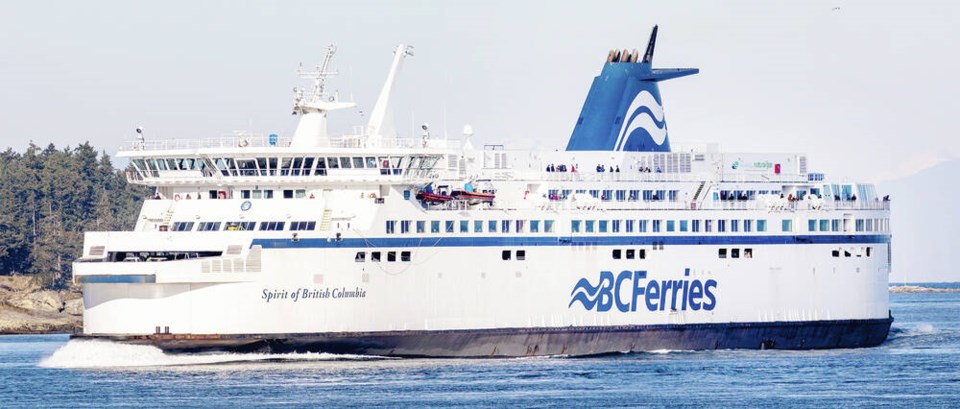The province’s decision to impose fines on B.C. Ferries for missed sailings due to crew shortages has some academics and other ferry watchers scratching their heads.
“I almost see the fine as a punishment in terms of, ‘You’re being bad. Fix your behaviour.’ And I’m sure B.C. Ferries is not cancelling ferries on purpose,” said Kimberley Speers, assistant teaching professor in UVic’s School of Public Administration, who called fines “a strange way” to address staffing shortages — a common problem for many organizations.
B.C. Ferries faces a fine of $7,000 if a sailing on a major route does not take place because of a staff shortage, or $1,000 on certain minor routes. The new penalty is part of the latest service contract that comes into effect in April between the province and B.C. Ferries.
Fines represent the cost of fuel that would have been used on those routes.
Speers suspects the government felt under pressure to be seen to be doing something. “This is a visible way of showing the public that they’ve heard the frustration of those who use B.C. Ferries and they are serious about trying to get B.C. Ferries to address this issue.”
Many sailings were cancelled this summer because of both crew shortages and mechanical issues.
Coastal Renaissance, which travels the route between Nanaimo’s Duke Point and Tsawwassen, is expected to be out of service until mid-December for an engine repair and refit.
B.C. Ferries is headed by the B.C. Ferry Authority, which has the only voting share for the company. The province holds all the non-voting shares. The organization became a commercial company in 2003.
David Black, a political communications expert at Royal Roads University, calls it a “strange corporate entity” — privately owned, yet with the B.C. government as its sole shareholder.
Bringing in fines seems somewhat performative, he said.
“You can’t really fine an entity into hiring when there is an insufficient pool of labour interested in work on the ferries.
“Fines don’t conjure willing and trained workers.”
And since B.C. Ferries is a Crown corporation in all but name, the move amounts to fining taxpayers, because public money supports the system, Black said. In the current fiscal year, B.C. Ferries is receiving $194 million from the province.
B.C. United transportation critic Trevor Halford also said fines don’t make sense.
“How is this better serving the people that rely on B.C. Ferries?” he asked, adding fines won’t help travellers who depend on ferries for medical appointments or to get to work or go on vacation. “This is just an attempt for [the province] to look like they’re doing something.”
Works needs to be done with Transport Canada in terms of minimum staffing numbers, Halford said.
Eric McNeely, president of the B.C. Ferry and Marine Workers Union, said any suggestion that minimum staffing levels should be reduced “seems a bit concerning to me,” adding B.C. Ferries has one of the best safety records among ferry systems.
Having the appropriate number of crew members makes the difference in being able to evacuate a vessel in a timely way, he said.
As for fines, McNeely said they’re more symbolic than significant, serving to highlight the shortcomings in the system. He hopes they help spur B.C. Ferries into focusing more on attracting, training and retaining people, thus making cancellations less likely.
One of the best ways to keep workers is to invest in professional education, allowing staff to advance and see that they have a career path, he said.
Employers in the marine sector are facing a competitive environment, and many pay more than B.C. Ferries. The union and B.C. Ferries have been in wage talks but nothing more is scheduled.
The Ministry of Transportation said potential fines will be a “disincentive for B.C. Ferries to cancel core sailings for issues within their control.”
A ministry statement acknowledges that B.C. Ferries is trying to find more workers, but says the possibility of penalties was included in the new Coastal Ferry Services Contract to “hold the company to account for the services it is contracted to provide.”
“While these penalties won’t entirely make up for someone who just had an important sailing cancelled, we expect some benefits to be returned to ferry users.”
Details of how penalties will be applied will be finalized ahead of the April 1, 2024 implementation.
>>> To comment on this article, write a letter to the editor: [email protected]



